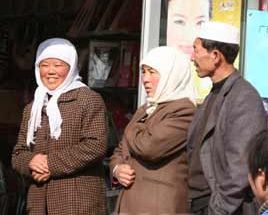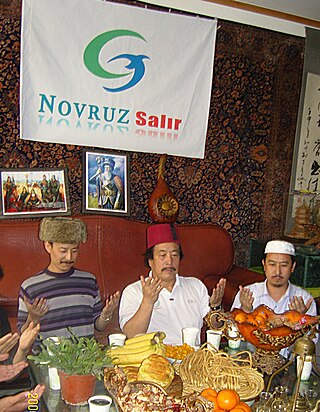
Chinese Islamic cuisine consists of variations of regionally popular foods that are typical of Han Chinese cuisine, in particular to make them halal. Dishes borrow ingredients from Middle Eastern, Turkic, Iranian and South Asian cuisines, notably mutton and spices. Much like other northern Chinese cuisines, Chinese Islamic cuisine uses wheat noodles as the staple, rather than rice. Chinese Islamic dishes include clear-broth beef noodle soup and chuanr.

The Hui people are an East Asian ethnoreligious group predominantly composed of Chinese-speaking adherents of Islam. They are distributed throughout China, mainly in the northwestern provinces and in the Zhongyuan region. According to the 2010 census, China is home to approximately 10.5 million Hui people. Outside China, the 170,000 Dungan people of Kazakhstan and Kyrgyzstan, Panthays in Myanmar and many of the Chin Haws in Thailand are also considered part of the Hui ethnicity.

Dungan is a term used in territories of the former Soviet Union to refer to a group of Muslim people of Hui origin. Turkic-speaking peoples in Xinjiang Province in Northwestern China also sometimes refer to Hui Muslims as Dungans. In both China and the former Soviet republics where they reside, however, members of this ethnic group call themselves Hui because Dungans are descendants of historical Hui groups that migrated to Central Asia.

Qinghai is an inland province in Northwestern China. It is the largest province of China by area and has the third smallest population. Its capital and largest city is Xining.

Hui pan-nationalism refers to the common identity among diverse communities of Chinese-speaking Muslims. Hui pan-nationalism should be distinguished from nationalist sentiments by minority groups who are also Muslim such as those of the Uyghurs. These sentiments are grounded upon the Hui "zealously preserving and protecting their identity as enclaves ensconced in the dominant Han society." In exchange for support during the Cultural Revolution, the Hui were granted high political participation. Hui pan-nationalism was one of the first sources of modern Chinese nationalism, influenced by Western, Japanese and Soviet influences.

The Salar people are a Turkic ethnic minority in China who speak Salar, a Turkic language of the Oghuz sub-branch. They numbered 165,159 people in 2020, according to that year's national census.
Jews and Judaism in China are predominantly composed of Sephardi Jews and their descendants. Other Jewish ethnic divisions are also represented, including Ashkenazi Jews, Mizrahi Jews and a number of converts.

Islam has been practiced in China since the 7th century CE. There are an estimated 17–25 million Muslims in China, less than 2 percent of the total population. Though Hui Muslims are the most numerous group, the greatest concentration of Muslims reside in northwestern China's Xinjiang autonomous region, which contains a significant Uyghur population. Lesser yet significant populations reside in the regions of Ningxia, Gansu and Qinghai. Of China's 55 officially recognized minority peoples, ten of these groups are predominantly Sunni Muslim.

The Turkic Islamic Republic of East Turkestan (TIRET) was a breakaway Islamic republic centered on the city of Kashgar, located in the far west of China's Xinjiang Province. It is often described as the First East Turkestan Republic to differentiate it from the Second East Turkestan Republic (1944–1946).

"Guo", written in Chinese: 郭, is one of the most common Chinese surnames and means "the wall that surrounds a city" in Chinese. It can also be transliterated as Cok, Gou, Quo, Quach, Quek, Que, Keh, Kuo, Kwo, Kuoch, Kok, Koc, Kwee, Kwek, Kwik, Kwok, Kuok, Kuek, Gock, Koay, or Ker. The Korean equivalent is spelled Kwak; the Vietnamese equivalent is Quách.
Freedom of religion in China may be referring to the following entities separated by the Taiwan Strait:

Religion in Macau is represented predominantly by Buddhism and Chinese folk religions. During the period in which the city was under Portuguese rule (1557–1999) the Catholic Church became one of the dominant faiths, but nowadays it has greatly declined.

Ding is a Chinese family name. It consists of only 2 strokes. The only two characters that have fewer strokes are "一" and "乙".

Tang, is a Chinese surname. The three languages also have the surname with the same character but different pronunciation/romanization. In Korean, it is usually romanized also as Dang. In Japanese, the surname is often romanized as To. In Vietnamese, it is commonly written as Đường. It is pronounced dhɑng in Middle Chinese, and lhāŋ in Old Chinese. It is the 64th name on the Hundred Family Surnames poem.

After the fall of the Qing dynasty following the Xinhai Revolution (1911-1912), Sun Yat-sen, who led the new Republic of China (1912–1949), immediately proclaimed that the country belonged equally to the Han, Hui (Muslim), Meng (Mongol), and Tsang (Tibetan) peoples. When the People's Republic of China was established in 1949, Chinese Muslims suffered political repression along with all other religious groups in China, especially during the Cultural Revolution (1966–1976).

The Shadian incident was an uprising of Muslim Hui people against the rule of Chinese Communist Party (CCP) during the Cultural Revolution, which was eventually suppressed by the People's Liberation Army in a massacre. In July and August, 1975, the uprising and the subsequent military suppression took place in several villages of Yunnan Province in southwest China, especially at the Shadian Town of Gejiu City. The estimated death toll was around 1,600 including 300 children, and 4,400 houses were destroyed.

The Mongols were highly tolerant of most religions during the early Mongol Empire, and typically sponsored several at the same time. At the time of Genghis Khan in the 13th century, virtually every religion had found converts, from Buddhism to Eastern Christianity and Manichaeanism to Islam. To avoid strife, Genghis Khan set up an institution that ensured complete religious freedom, though he himself was a Tengrist. Under his administration, all religious leaders were exempt from taxation, and from public service. Mongol emperors were known for organizing competitions of religious debates among clerics, and these would draw large audiences.

The Panthay Rebellion (1856–1873), also known as the Du Wenxiu Rebellion, was a rebellion of the Muslim Hui people and other ethnic groups against the Manchu-led Qing dynasty in southwestern Yunnan Province, as part of a wave of Hui-led multi-ethnic unrest.
Uyghur nationalism is a nationalist movement which asserts that the Uyghur people, an ethnic minority in China, are a distinct nation. Uyghur nationalism promotes the cultural unity of the Uyghur people, either as an independent group or as a regional group within a larger Chinese nation.














